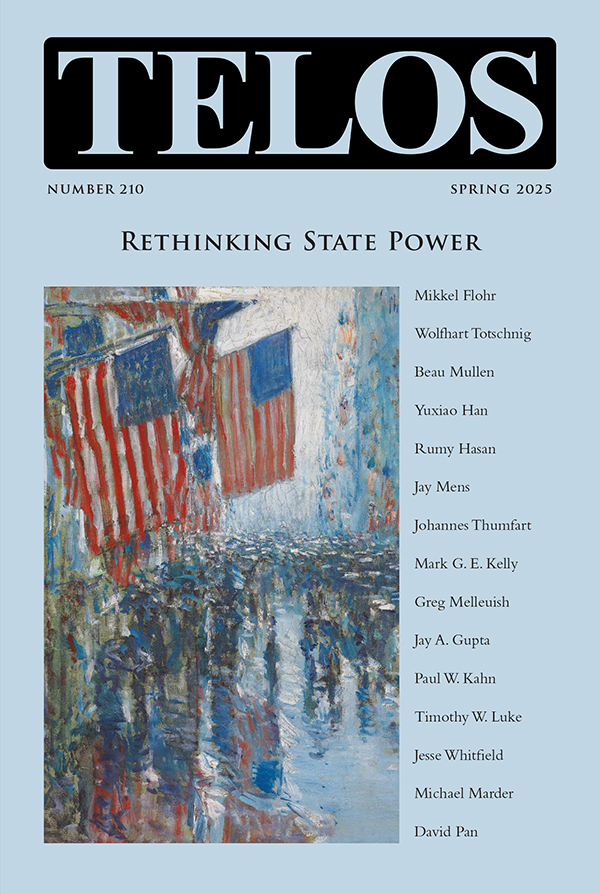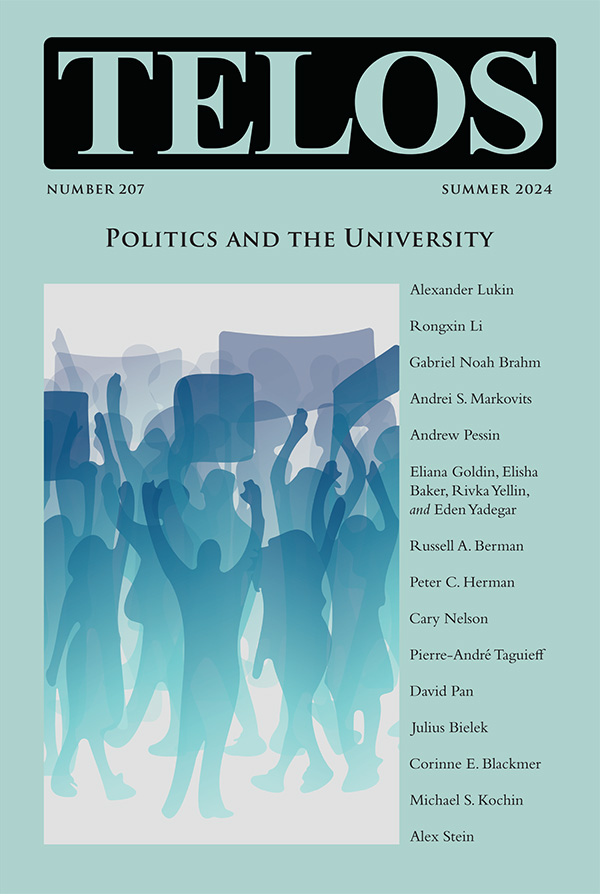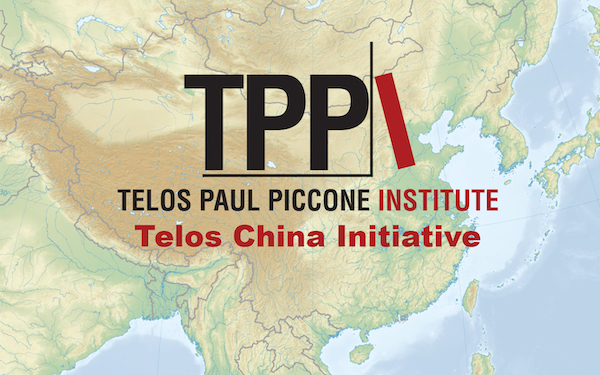By David Pan · Monday, March 24, 2025 Telos 210 (Spring 2025): Rethinking State Power is now available for purchase in our store. Individual subscriptions to Telos are also available in both print and online formats.
 Frustrating the hopes of cosmopolitans and globalists, state power is back. Rather than imagining a replacement of sovereignty with law, political debates now revolve around the particular forms that state sovereignty might take. Even Europe, long seeing itself as the place from which a new international legal order might expand its reach, is reinvesting in military power to protect its sovereignty from the threats posed by Russia, China, and, in some ways, the United States. Yet this realization about the continuing centrality of the state does not mean an abandonment of the moral imperatives and prejudices of the people. On the contrary, state power is being recognized as the instrument through which the people can exercise their will, even as the state places constraints on popular sovereignty. The essays in this issue of Telos consider the ways in which state power interacts with popular attitudes and social institutions in order to establish the basis for sovereignty and law. Frustrating the hopes of cosmopolitans and globalists, state power is back. Rather than imagining a replacement of sovereignty with law, political debates now revolve around the particular forms that state sovereignty might take. Even Europe, long seeing itself as the place from which a new international legal order might expand its reach, is reinvesting in military power to protect its sovereignty from the threats posed by Russia, China, and, in some ways, the United States. Yet this realization about the continuing centrality of the state does not mean an abandonment of the moral imperatives and prejudices of the people. On the contrary, state power is being recognized as the instrument through which the people can exercise their will, even as the state places constraints on popular sovereignty. The essays in this issue of Telos consider the ways in which state power interacts with popular attitudes and social institutions in order to establish the basis for sovereignty and law.
Continue reading →
By David Pan · Friday, July 12, 2024 Telos 207 (Summer 2024): Politics and the University is now available for purchase in our store. Individual subscriptions to Telos are also available in both print and online formats.
 There is a fundamental arbitrariness about the work that is done at colleges and universities, which stems from the relationship between academic work and the political parameters of this work. The key issue is that the most basic aspect of our humanity involves having a sense of right and wrong. This sense of values sets the framework for all our other thoughts, actions, and decisions, providing direction and meaning for our lives. There is a fundamental arbitrariness about the work that is done at colleges and universities, which stems from the relationship between academic work and the political parameters of this work. The key issue is that the most basic aspect of our humanity involves having a sense of right and wrong. This sense of values sets the framework for all our other thoughts, actions, and decisions, providing direction and meaning for our lives.
The feeling that we are doing the right thing can motivate us to great achievements, and the loss of that feeling can lead us into inescapable despair. At the same time, when we perceive that others are doing wrong, we have a feeling of indignation at such injustice and seek to redress it. We will also judge the wrong doer in the same harsh light that we might use against ourselves when we fail to live up to our own ideals. Consequently, our sense of values will color all our perceptions and determine our decisions and judgments.
Continue reading →
The 2025 Telos-Paul Piccone Institute Annual Conference
March 21–22, 2025
New York, NY
China Keywords / 中国关键词
A one-page version of this call for papers, in PDF form, is available here. We encourage you to print and post this page in your home institution.
About the Conference
The 2025 annual conference of the Telos-Paul Piccone Institute will culminate the first year of a five-year program—the Telos China Initiative—that has aimed to set Telos on a distinct intellectual course.
 The Telos circle falls outside many conventional intellectual categories. During the Cold War, this quality enabled us to form a bridge between Eastern Europe and the Anglosphere. We fostered work by Soviet-bloc intellectuals, helping Western readers understand the ideological dynamics at play behind the Iron Curtain; we supported a wide variety of dissidents in their opposition to bureaucratic centralization, as we have likewise for opponents of bureaucratic governance in the West; and we brokered an encounter between Marxism and phenomenology that was vital for critical thinkers in the Soviet and the liberal democratic world. The Telos circle falls outside many conventional intellectual categories. During the Cold War, this quality enabled us to form a bridge between Eastern Europe and the Anglosphere. We fostered work by Soviet-bloc intellectuals, helping Western readers understand the ideological dynamics at play behind the Iron Curtain; we supported a wide variety of dissidents in their opposition to bureaucratic centralization, as we have likewise for opponents of bureaucratic governance in the West; and we brokered an encounter between Marxism and phenomenology that was vital for critical thinkers in the Soviet and the liberal democratic world.
We believe that the future of the TPPI now lies in a parallel reciprocal engagement with China, to which we have given steadily increasing focus for the past ten years in our annual conferences. These meetings have laid the basis for seven special issues of the journal Telos, as well as numerous individual articles in the field. With the Telos China Initiative, we seek to become a key bridge for a mutually regarding, critical discussion of social and political theory between China and the West, well beyond the circles of East Asia specialists.
Continue reading →
The video of the third webinar in the Telos-Paul Piccone Institute’s “China Keywords” series is now available and can be viewed here. In this webinar, Eric Hendriks talks with Prof. Shadi Bartsch about the reception and use of ancient Greek philosophers in contemporary Chinese political thought.
Prof. Bartsch is the Helen A. Regenstein Distinguished Service Professor of Classics at the University of Chicago and the author and editor of a dozen books on Greek and Roman Antiquity. For her latest monograph on the reception of the ancient Greeks in China, she spent ten years studying Mandarin. The effort paid off: its fruit is Plato Goes to China: The Greek Classics and Chinese Nationalism (Princeton University Press, 2023).
Continue reading →
 The third webinar of the Telos-Paul Piccone Institute’s “China Keywords” series, entitled “The Greeks according to Chinese Nationalist Intellectuals,” will take place on Thursday, May 16, from 10:00 to 11:00 a.m. Eastern Time (16:00 to 17:00 Central European Time). Our guest will be Prof. Shadi Bartsch, who will discuss the reception and use of ancient Greek philosophers in contemporary Chinese political thought. Plato and Aristotle figure prominently in anti-Western polemics. The third webinar of the Telos-Paul Piccone Institute’s “China Keywords” series, entitled “The Greeks according to Chinese Nationalist Intellectuals,” will take place on Thursday, May 16, from 10:00 to 11:00 a.m. Eastern Time (16:00 to 17:00 Central European Time). Our guest will be Prof. Shadi Bartsch, who will discuss the reception and use of ancient Greek philosophers in contemporary Chinese political thought. Plato and Aristotle figure prominently in anti-Western polemics.
Click here to register for the webinar.
Continue reading →
Announcing a new Telos-Paul Piccone Institute webinar series, “China Keywords,” beginning Thursday, March 21, at 10 a.m. Eastern Time.
Register for the event here.
 Tipping our hat to Keywords: A Vocabulary of Culture and Society, by Raymond Williams, the Telos-Paul Piccone Institute announces its newest webinar series: “China Keywords.” Each webinar will introduce and explore a single concept essential for understanding contemporary Chinese social and political theory. The series will illuminate these concepts with an eye toward non-specialists in the West, while also addressing deep contestations of interest to experts in the field. “China Keywords” is part of TPPI's larger Telos China Initiative. Tipping our hat to Keywords: A Vocabulary of Culture and Society, by Raymond Williams, the Telos-Paul Piccone Institute announces its newest webinar series: “China Keywords.” Each webinar will introduce and explore a single concept essential for understanding contemporary Chinese social and political theory. The series will illuminate these concepts with an eye toward non-specialists in the West, while also addressing deep contestations of interest to experts in the field. “China Keywords” is part of TPPI's larger Telos China Initiative.
Continue reading →
|
|
 Frustrating the hopes of cosmopolitans and globalists, state power is back. Rather than imagining a replacement of sovereignty with law, political debates now revolve around the particular forms that state sovereignty might take. Even Europe, long seeing itself as the place from which a new international legal order might expand its reach, is reinvesting in military power to protect its sovereignty from the threats posed by Russia, China, and, in some ways, the United States. Yet this realization about the continuing centrality of the state does not mean an abandonment of the moral imperatives and prejudices of the people. On the contrary, state power is being recognized as the instrument through which the people can exercise their will, even as the state places constraints on popular sovereignty. The essays in this issue of Telos consider the ways in which state power interacts with popular attitudes and social institutions in order to establish the basis for sovereignty and law.
Frustrating the hopes of cosmopolitans and globalists, state power is back. Rather than imagining a replacement of sovereignty with law, political debates now revolve around the particular forms that state sovereignty might take. Even Europe, long seeing itself as the place from which a new international legal order might expand its reach, is reinvesting in military power to protect its sovereignty from the threats posed by Russia, China, and, in some ways, the United States. Yet this realization about the continuing centrality of the state does not mean an abandonment of the moral imperatives and prejudices of the people. On the contrary, state power is being recognized as the instrument through which the people can exercise their will, even as the state places constraints on popular sovereignty. The essays in this issue of Telos consider the ways in which state power interacts with popular attitudes and social institutions in order to establish the basis for sovereignty and law. 
 The Telos circle falls outside many conventional intellectual categories. During the Cold War, this quality enabled us to form a bridge between Eastern Europe and the Anglosphere. We fostered work by Soviet-bloc intellectuals, helping Western readers understand the ideological dynamics at play behind the Iron Curtain; we supported a wide variety of dissidents in their opposition to bureaucratic centralization, as we have likewise for opponents of bureaucratic governance in the West; and we brokered an encounter between Marxism and phenomenology that was vital for critical thinkers in the Soviet and the liberal democratic world.
The Telos circle falls outside many conventional intellectual categories. During the Cold War, this quality enabled us to form a bridge between Eastern Europe and the Anglosphere. We fostered work by Soviet-bloc intellectuals, helping Western readers understand the ideological dynamics at play behind the Iron Curtain; we supported a wide variety of dissidents in their opposition to bureaucratic centralization, as we have likewise for opponents of bureaucratic governance in the West; and we brokered an encounter between Marxism and phenomenology that was vital for critical thinkers in the Soviet and the liberal democratic world. 

